A man without a plan is not a man.
–Friedrich Wilhelm Nietzsche
Got your tools, time and motivation? Great.
Now you need a plan. A roadmap. Here’s the road I took.
While there are always exceptions, rules of thumb are good starting points for the uninitiated. The anatomy of how to build your scenes is captured here within the works of these authors. It’s not overbearing, and it’s not highly technical. If it’s a bit of a formula, I’m betting that’s exactly what you’re looking for at this point. Don’t overthink your creative requirements here. Save those for your description and dialogue.
If you have great ideas, but you struggle with writing, then you’re not in the right place. Yet. Go take some writing classes, build your chops, join some writing groups, and listen to what some of them say (the ones who have published work you respect).
If you consider yourself a competent writer, and you want to share your work with others, you’re in the right place. I consider myself a competent writer, and I spent a year reading in my genre and beyond before I started writing.
Read. Read more. Read a lot.
Listed here are the books I recommend you read before you begin writing your novel in earnest, maybe interspersed with your target genre reading. This is the most practical order, the order I didn’t use, but the order I recommend as the most enlightening.
[wc_divider style=”solid” line=”single” margin_top=”” margin_bottom=””]
[wc_row][wc_column size=”one-fourth” position=”first”] [/wc_column][wc_column size=”three-fourth” position=”last”]
[/wc_column][wc_column size=”three-fourth” position=”last”]
Story Engineering by Larry Brooks
Read this one first. It’s no good writing a million words and getting there in a hurry if you’re not sure where you’re going. This is a great primer on understanding the structure of a novel. Presuming you’re writing or in the process or thinking about writing a novel, start here. It’s actually not that complex, and the work is full of great examples. In fact, read it twice; the lessons will come in handy later. Listen to this guy. He knows what he’s talking about.
[/wc_column][/wc_row]
[wc_row][wc_column size=”one-fourth” position=”first”] [/wc_column][wc_column size=”three-fourth” position=”last”]
[/wc_column][wc_column size=”three-fourth” position=”last”]
The 12 Key Pillars of Novel Construction by C. S. Lakin
Another great resource to help prep would-be authors with the entire novel-writing process, from concept to finished draft. C.S. Lakin has wonderful resources, both in her books and on her website. Don’t be overwhelmed. The explanations and examples can be intimidating, but the information here is extensive and solid. The more you take away from this author, the better chance you’ll have of creating a solid story and taking a positive step in the direction of becoming a successful author.
[/wc_column]
[wc_row][wc_column size=”one-fourth” position=”first”]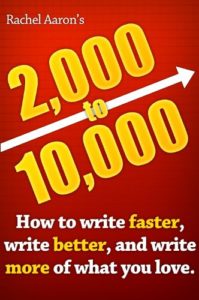 [/wc_column][wc_column size=”three-fourth” position=”last”]
[/wc_column][wc_column size=”three-fourth” position=”last”]
2k to 10k by Rachel Aaron
It looks like a book, but it’s not. It was originally a blog post that she turned into an ebook and sold as an ebook. Like the previous entry, this is an easy read, and especially valuable, both as a writing approach and as inspiration to demonstrate that for competent writers, your story can flow quickly from your creative mind through your fingers and into your work-in-progress. I found Rachel’s insights invaluable in developing a regular writing habit.
[/wc_column]
[wc_column size=”one-fourth” position=”first”]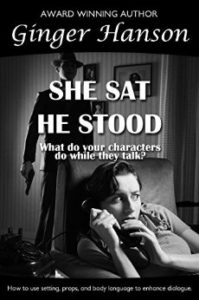 [/wc_column][wc_column size=”three-fourth” position=”last”]
[/wc_column][wc_column size=”three-fourth” position=”last”]
She sat He stood by Ginger Hanson
I know. The title is somewhat underwhelming, but the contents and techniques outlined here are superbly helpful in developing your outline and subsequent manuscript. What are those essential elements the reader needs to understand your story without being overwhelmed with nauseating detail? This will give you a head start. In retrospect, I think I would have liked to have read this one sooner than I actually did. I think it would have helped quicken my pace and finalize my outlines and manuscript sooner.
[/wc_column]
[wc_column size=”one-fourth” position=”first”]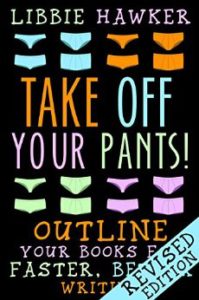 [/wc_column][wc_column size=”three-fourth” position=”last”]
[/wc_column][wc_column size=”three-fourth” position=”last”]
Take off your pants! by Libbie Hawker
It’s not what you think. The concept of “pantsing” or uncovering the story as you write is a writing approach used by many authors, some of them quite famous. Read Stephen King’s “On Writing” for one key example. This is the opposite. For someone who doesn’t have King’s writing chops, figuring out what’s going to happen before you sit down to write has some real benefits that include more productive writing time and, in the end, fewer major revisions. Unless, of course, revisions is what you’re trying for.
[/wc_column]
[wc_row][wc_column size=”one-fourth” position=”first”] [/wc_column][wc_column size=”three-fourth” position=”last”]
[/wc_column][wc_column size=”three-fourth” position=”last”]
The Anatomy of Story by John Truby
Read John Truby’s work before I did. This is well respected and practical advice for storytelling. Develop stronger characters and scribe engaging plotlines using the author’s advice. I put this off for quite some time and kicked myself later thinking I should not have been so quick to overlook it in favor of other, shinier books. It’s well worth your while to read about Truby’s 22 steps. You probably thought there were only 12 steps. Think again. Practical insights and a logical approach to sharing your story with the world.
[/wc_column]
[wc_column size=”one-fourth” position=”first”]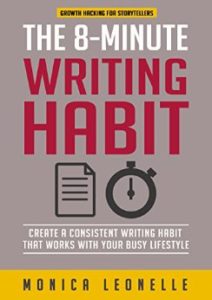 [/wc_column][wc_column size=”three-fourth” position=”last”]
[/wc_column][wc_column size=”three-fourth” position=”last”]
The 8-minute writing habit by Monica Leonelle
She’s smart and has great ideas. If you’re like me and have a full-time job, and family and dogs and a yard and other responsibilities, Monica’s insights are precious. Originally, I wrote when I could block out the right amount of time, but in this breakthrough concept, she talks about how finding time to write is a lot more about mental blocks than practical blocks. She offers exercises to break down mental reservations that keep us from adding to our own bodies of writing work on a daily basis. Emulate her practices and pick up on some of the boundless energy that permeates all of her writing.
[/wc_column]
[wc_column size=”one-fourth” position=”first”]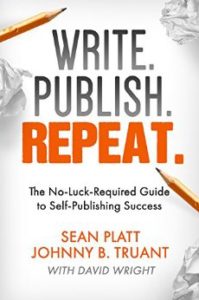 [/wc_column][wc_column size=”three-fourth” position=”last”]
[/wc_column][wc_column size=”three-fourth” position=”last”]
Write. Publish. Repeat. by Sean Platt, Johnny B. Truant with David Wright
These guys crack me up. They’re making a living at indie publishing and have great lessons to share. I listen to their profound and sometimes profane podcasts on a semi-regular basis and recommend that, if you’re serious about self-publishing, you pick up on the insights they and their like-minded guests offer. Part of this is about writing, but it’s bigger than that. It’s about figuring out a way to navigate your way through the constantly changing labyrinth of the independent online publishing business. They’ve been pretty successful, and they’re always writing and talking about it.
[/wc_column]
[wc_column size=”one-fourth” position=”first”]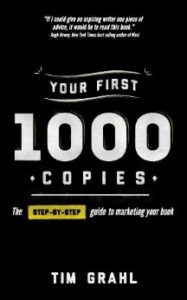 [/wc_column][wc_column size=”three-fourth” position=”last”]
[/wc_column][wc_column size=”three-fourth” position=”last”]
Your first 1,000 books by Tim Grahl
At a certain point, you’re going to want to upload your book and hit the publish button. Before you do, read this book. Tim’s free online series “Hacking Amazon” is something unique, and his online resources are a real boon to the independent publisher. Here he talks about what to do after you’ve finished your manuscript and your book, and you’re ready to move further into the world of self-publishing. If you’re to be successful at self-publishing, you’ll need to be an apt pupil of self-marketing, too. He’s the expert, and from what I can tell, he’s pretty up front about his experiences.
[/wc_column]
[wc_divider style=”solid” line=”single” margin_top=”” margin_bottom=””]
That’s it. I’m not going to include “On Writing” because I’ve already alluded to it, and you’ve already read it. I guess my only advice is when you get stuck, go back and read it again, both for enjoyment and for inspiration. Certainly, this is not an exhaustive list, but in retrospect, I think these are the ones that made the biggest impression on me. The only other advice I can give if you want to be a writer is simply to read. Read extensively but not exclusively in your target genre. Your ability to conceive and synthesize new ideas will make the difference between a book and an intriguing piece of work the reader can’t put down. As I’ve said before, these books won’t make you a great writer. Only you can do that. Read widely and emulate the greats. Don’t just write something. Write something special.
Now, on to the writing implements.